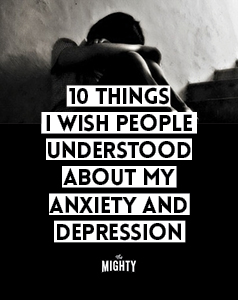10 Things I Wish My Family and Friends Understood About My Anxiety and Depression
As someone who has lived with mental illness for a long time, I understand people feeling weary about sharing their feelings with friends and family. Sometimes it seems like there is no way they could ever understand what you’re going through. In my personal experience I have found they did try their best to understand and support me; however, there are some things that may be difficult for them to fully understand.
1. Sometimes I cannot find an explanation for why I feel the way I do.
There are times when my anxiety and depression act up and I don’t know why. I understand there is usually a trigger, but sometimes even I don’t know what it is. Unfortunately, my mental illness doesn’t come with an informational pamphlet about what triggers it.
2. Being constantly asked if I am OK can lead to me feeling even worse.
Sometimes when you ask me if I am OK, there is honestly nothing wrong — the constant questioning can make me panic about whether I am unintentionally acting like something wrong. In this panic I manage to convince myself you think I am upset too often or that I am making up my illness. I know it’s irrational, but I can’t help it.
3. Whenever I seem to want the most space is usually when I need the most support.
When I start to go into a depressive episode or my anxiety is particularly high, I try to isolate myself. I hide in my room or spend an immense amount of time outside of the house to try to stay away from people. When I’ve locked myself in my room it means more to me than you could ever know when you just come lay next to me with no need for explanation or words of any kind.
4. Some days it really is impossible for me to get out of bed.
This one is particularly difficult for some people to understand. Whenever I lay is my bed “avoiding my responsibilities,” I really do want to be productive. I want to right that essay and take that online test; I just can’t bring myself to do it. I feel like I am paralyzed. And not being able to fulfill my responsibilities tends to make my anxiety even worse. I am not just being lazy or procrastinating; I simply cannot do it at the time.
5. I don’t mean to avoid people.
Don’t take it personally if I give a “no” to your invitation to go out or don’t respond to your text. It’s not that I don’t want to see or talk to you, sometimes I just don’t feel like talking to anyone. I just need some time to sort out what’s going on inside of my head, and going to a movie or texting you about the newest episode of “The Walking Dead” makes me feel like I am never going to be able figure out my own brain.
6. I still care about you, probably more than I care about myself.
No matter how bad I feel, I still want what’s best for you. When I genuinely start to avoid you, for weeks or even months at a time, it’s not because you’ve done something wrong; I just feel like you are better off without me. I begin to think your life will be happier without me in it and that my mental illness is dragging you down. Even if being around you makes me happy and forget about my illness for a minute (which can be the most helpful thing in the world), I will try to sacrifice that if I feel like I am an inconvenience to you in any way. In times like these I just need reassurance that you don’t feel like I am a nuisance. And I might not believe you right away, but it will help to bring me out of that downward spiral, and it makes me remember you care about me too.
7. There are days when I feel completely numb to my emotions.
If I look like I am walking around like an emotionless zombie, that’s probably how I feel. Sometimes all of my emotions seem distant to me; I know what I should be feeling, but I can’t quite grasp the feeling itself. And sometimes I will feel like this and you will never know; since I know what I should be feeling, I’ve learned to act as though I am feeling this emotion.
8. There are days when I feel too many emotions all at once.
Opposite to not feeling anything, sometimes I feel entirely too much. This can manifest in many ways; I may feel sad, excited, angry, hopeful, desperate, love and hate all at once. So if I seem like I am jumping from one emotion to the next extremely quickly it’s because I am trying to hold on to one emotion at a time, but I can’t hole one long before it jumps to another.
9. I am trying to feel better. I really am.
I don’t like feeling this way, and I would never choose to have a mental illness. Even if it doesn’t always seem like it, everything I do is an attempt to make myself feel better. Even if it’s something that seems self-destructive, at the time I genuinely feel like it will make me feel better eventually. I don’t like feeling like this because of how damaging it is to me and to you, so I try my best to fix it as well as I can.
10. I truly appreciate everything you do for me
I know caring for someone with a mental illness can be difficult; we push you away or try to cling to you forever, and trying to pull us out of one of our episodes can be draining for you, but you do it anyway. I will never be able to express just how much your support means to me — the 3 a.m. phone calls where you’ve pulled me out of an anxiety attack, the times when you’ve calmed me down when we’ve been out, and I seemed super happy, but all if the sudden I burst into tears, and your constant reassurance that you’re there for me. Your support is what makes my mental illness bearable, and I cannot express just how much I love you for it.
If you or someone you know needs help, please visit the National Suicide Prevention Lifeline. You can also reach the Crisis Text Line by texting “START” to 741-741. Head here for a list of crisis centers around the world.
The Crisis Text Line is looking for volunteers! If you’re interesting in becoming a Crisis Counselor, you can learn more information here.


